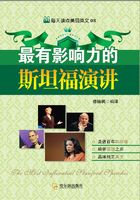
第10章 以简单的愉悦换取更复杂 更富有挑战性的快乐(1)
Trade Easy Pleasures for More Complex and Challenging Ones
Good morning.
Thank you, President Hennessy.
It is a great honor to be asked to give the Commencement address at my alma mater. Although I have two degrees from Stanford, I still feel a bit like an interloper on this exquisitely beautiful campus. A person never really escapes his or her childhood.
At heart I‘m still a working-class kid-half Italian, half Mexican- from L.A., or more precisely from Hawthorne, a city that most of this audience knows only as the setting of Quentin Tarantino’s Pulp Fiction and Jackie Brown-two films that capture the ineffable charm of my hometown.
Today is Father‘s Day, so I hope you will indulge me for beginning on a personal note. I am the first person in my family ever to attend college, and I owe my education to my father, who sacrificed nearly everything to give his four children the best education possible.
My dad had a fairly hard life. He never spoke English until he went to school. He barely survived a plane crash in World War II. He worked hard, but never had much success, except with his family.
When I was about 12, my dad told me that he hoped I would go to Stanford, a place I had never heard of. For him, Stanford represented every success he had missed yet wanted for his children. He would be proud of me today-no matter how dull my speech.
On the other hand, I may be fortunate that my mother isn’t here. It isn‘t Mother’s Day, so I can be honest. I loved her dearly, but she could be a challenge. For example, when she learned I had been nominated to be chairman of the National Endowment for the Arts, she phoned and said,“Don‘t think I’m impressed.”
I know that there was a bit of controversy when my name was announced as the graduation speaker. A few students were especially concerned that I lacked celebrity status. It seemed I wasn‘t famous enough. I couldn’t agree more. As I have often told my wife and children,“I‘m simply not famous enough.”
And that-in a more general and less personal sense-is the subject I want to address today, the fact that we live in a culture that barely acknowledges and rarely celebrates the arts or artists.
There is an experiment I’d love to conduct. I‘d like to survey a cross- section of Americans and ask them how many active NBA players, Major League Baseball players, and American Idol finalists they can name.
Then I’d ask them how many living American poets, playwrights, painters, sculptors, architects, classical musicians, conductors, and composers they can name.
I‘d even like to ask how many living American scientists or social thinkers they can name.
Fifty years ago, I suspect that along with Mickey Mantle, Willie Mays, and Sandy Koufax, most Americans could have named, at the very least, Robert Frost, Carl Sandburg, Arthur Miller, Thornton Wilder, Georgia O’Keeffe, Leonard Bernstein, Leontyne Price, and Frank Lloyd Wright. Not to mention scientists and thinkers like Linus Pauling, Jonas Salk, Rachel Carson, Margaret Mead, and especially Dr. Alfred Kinsey.
I don‘t think that Americans were smarter then, but American culture was. Even the mass media placed a greater emphasis on presenting a broad range of human achievement.
I grew up mostly among immigrants, many of whom never learned to speak English. But at night watching TV variety programs like the Ed Sullivan Show or the Perry Como Music Hall, I saw-along with comedians, popular singers, and movie stars-classical musicians like Jascha Heifetz and Arthur Rubinstein, opera singers like Robert Merrill and Anna Moffo, and jazz greats like Duke Ellington and Louis Armstrong captivate an audience of millions with their art.
The same was even true of literature. I first encountered Robert Frost, John Steinbeck, Lillian Hellman, and James Baldwin on general interest TV shows. All of these people were famous to the average American-because the culture considered them important.
Today no working-class or immigrant kid would encounter that range of arts and ideas in the popular culture. Almost everything in our national culture, even the news, has been reduced to entertainment, or altogether eliminated.
The loss of recognition for artists, thinkers, and scientists has impoverished our culture in innumerable ways, but let me mention one. When virtually all of a culture’s celebrated figures are in sports or entertainment, how few possible role models we offer the young.
There are so many other ways to lead a successful and meaningful life that are not denominated by money or fame. Adult life begins in a child‘s imagination, and we’ve relinquished that imagination to the marketplace.
Of course, I‘m not forgetting that politicians can also be famous, but it is interesting how our political process grows more like the entertainment industry each year. When a successful guest appearance on the Colbert Report becomes more important than passing legislation, democracy gets scary. No wonder Hollywood considers politics“show business for ugly people”.
Everything now is entertainment. And the purpose of this omnipresent commercial entertainment is to sell us something. American culture has mostly become one vast infomercial.
I have a reccurring nightmare. I am in Rome visiting the Sistine Chapel. I look up at Michelangelo’s incomparable fresco of the“Creation of Man”.I see God stretching out his arm to touch the reclining Adam‘s finger. And then I notice in the other hand Adam is holding a Diet Pepsi.
When was the last time you have seen a featured guest on David Letterman or Jay Leno who isn’t trying to sell you something? A new movie, a new TV show, a new book, or a new vote?
Don‘t get me wrong. I love entertainment, and I love the free market. I have a Stanford MBA and spent 15 years in the food industry. I adore mybig-screen TV. The productivity and efficiency of the free market is beyond dispute. It has created a society of unprecedented prosperity.